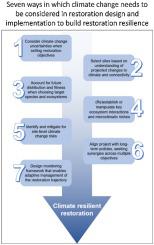Perspectives in Ecology and Conservation ( IF 4.0 ) Pub Date : 2021-06-11 , DOI: 10.1016/j.pecon.2021.05.002 William D. Simonson , Ellen Miller , Alastair Jones , Shaenandhoa García-Rangel , Hazel Thornton , Chris McOwen

|
Ecological restoration is a tool for climate change mitigation and adaptation, and yet its outcomes are susceptible themselves to climate change impacts. Drawing on the literature documenting this in theory and practice, we present a comprehensive overview of climate change risks and considerations across the whole life cycle of a restoration initiative. The resulting framework identified seven areas of restoration design and implementation in which climate change is important to address: setting restoration objectives, selecting sites and managing connectivity, choosing target species and ecosystems, managing key ecosystem interactions and micro-climates, identifying and mitigating site-level climate change risks, aligning the project with long-term policies, and designing a monitoring framework that enables adaptive management. A scan of restoration projects focussing on two regions – Brazil and countries of the Association of Southeast Asian Nations, ASEAN – revealed limited inclusion of these considerations in practice, with less than 5% of the projects evidently addressing at least one of the seven areas. We discuss two projects showing good practice in climate resilient restoration: restoration of Atlantic forest in Brazil that plans for climate change in connectivity and hydrological management, species selection, and policy alignment, and crayweed underwater forest restoration in Sydney, Australia, whose careful attention to species provenance, genotype measurement and monitoring provided a “future-proofing” approach to restoration success in the long term. Building on such examples, our framework can be used as a tool to support global restoration targets and the UN Decade on Ecosystem Restoration 2021–2030 through more climate resilient restoration.
中文翻译:

增强生态恢复的气候变化适应力——行动框架
生态恢复是减缓和适应气候变化的工具,但其结果本身容易受到气候变化的影响。借鉴在理论和实践中记录这一点的文献,我们全面概述了恢复计划整个生命周期中的气候变化风险和考虑因素。由此产生的框架确定了气候变化很重要的七个恢复设计和实施领域:设定恢复目标、选择地点和管理连通性、选择目标物种和生态系统、管理关键的生态系统相互作用和微气候、确定和减轻地点——调整气候变化风险,使项目与长期政策保持一致,并设计一个支持适应性管理的监测框架。对以巴西和东南亚国家联盟、东盟国家这两个地区为重点的修复项目的扫描显示,这些考虑在实践中的纳入有限,只有不到 5% 的项目明显涉及七个领域中的至少一个。我们讨论了两个展示气候复原力恢复良好实践的项目:巴西的大西洋森林恢复计划在连通性和水文管理、物种选择和政策调整方面应对气候变化,以及澳大利亚悉尼的螯草水下森林恢复,其密切关注物种来源、基因型测量和监测为长期恢复成功提供了一种“面向未来”的方法。基于这样的例子,











































 京公网安备 11010802027423号
京公网安备 11010802027423号